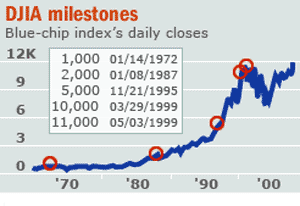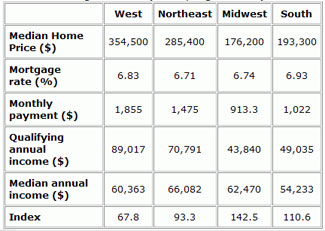
The Federal Reserve released their Beige Book today, an anecdotal take on the US economy by each of its 12 member banks. Its a good “ground level” overview of the economy performed by their in-house economists. Its a must read because it clearly parses out the different sectors of the economy (not because they interview me).
The Fed Governors have been busy speaking this week, hoping to influence the markets and public sentiment. The Beige Book and Vice Chairman Kohn gave some hope today for those who feel there needs to be a rate cut. (hint: Wall Street)
>In a speech in New York, Fed Vice Chairman Donald L. Kohn said the central bank would remain “flexible” and would “act as needed” to prevent the housing crisis and credit crunch from damaging the economy.

The DJIA jumped 2.6% today, the largest increase since 2003.
I have not yet been able to get my arms around the disconnect with understanding the economy without considering the impact of the deteriorating housing market. Some say the Fed is behind the curve.
Retail was spending was down on Black Friday even though Cyber Monday spending was up. The holiday seasons is expected to be off from last year.
>American shoppers, lured by longer opening hours and deep discounts, turned out in greater numbers over the post-Thanksgiving weekend than they did last year — but the average amount they spent decreased, according to the National Retail Federation’s 2007 Black Friday Weekend Survey. The number of shoppers went up 4.8% to more than 147 million over the long weekend, but they spent an average $347.44, a 3.5% drop from 2006. Consumer spending is being affected by high food and energy costs as well as the housing slump.
Banking is already taking a big hit, primarily due to mortgages. According the FDIC’s release today:
>Industry performance was hurt by asset-quality problems and volatility in financial markets during the third quarter. Almost half of all insured institutions reported year-over-year declines in earnings. Residential mortgage loans were the focal point of asset-quality problems. But delinquency and loss rates were up across all major loan categories,” said FDIC Chairman Sheila Bair. “Because insured financial institutions entered this period of uncertainty with strong earnings and capital, they are in a better position both to absorb the current stresses and to provide much needed credit as other sources withdraw. Going forward, the outlook for the industry depends on the severity of the housing downturn and the extent to which it spills over into the broader economy.
According to the Fed’s Beige Book, housing is spilling.
>Demand for residential real estate remained quite depressed, with only a few tentative and scattered signs of stabilization amidst the ongoing slowdown. Most Districts pointed to further increases in the inventory of available homes, with the earlier tightening of credit conditions for mortgage lending continuing to create barriers for some buyers. Consequently, prices on new and existing homes sold were reported to be down on a short-term or year-earlier basis in most Districts. The pace of homebuilding remained very low in general, and builders continued to shelve projects and lay off workers in many areas; contacts generally do not expect a significant pickup in homebuilding until well into next year at the earliest. Among scattered positive signs, however, co-op and condo sales in New York City picked up during the survey period, Richmond reported favorable readings on home sales in a few areas, and Kansas City reported that home inventories fell a bit in the Denver metro area. Weak home demand had mixed effects on conditions in rental markets: Chicago reported that builders’ conversions of new homes to rental property put downward pressure on rents, while Dallas noted that demand for apartments picked up, in part because some potential homebuyers are unable to qualify for mortgages.
I worry that the Fed won’t take action quick enough though. A 25 basis point cut won’t cut it.
I have been worried about a recession for more than a year now. Since its been six years and many may have forgotten what a recession actually is. There is some argument that we are already in one but don’t yet know it.
UPDATE: As Lenders Tighten Flow of Credit, Growth at Risk [NYT]




